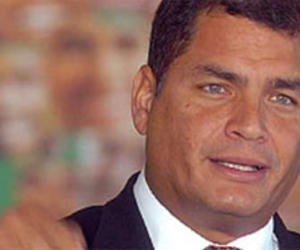A coup defeated
- Submitted by: manso
- international
- 10 / 11 / 2010

LA JORNADA. Wednesday, 06 October 2010 12:27 La Jornada. An editorial in the Mexican newspaper La Jornada
http://tinyurl.com/25wrnoo
It is abundantly clear that the police mafia that revolted in Quito and held Ecuadorean President Rafael Correa hostage for most of the day, did not act in defense of the labor victories of the police, as the rebels claimed.
The discontent among the uniformed forces over the recent legislative approval of a new public service law, which ultimately benefits them, had to be the result of a campaign of poisoning and disinformation with subversive and putschist objectives.
The instigators are also exposed: corrupt "brotherhoods" entrenched in the police, the oligarchy and the so-called "intelligence community" of the United States. The visible bond between the latter and the insurgents is the adventurer Lucio Gutierrez, a putschist military officer in 2000, elected president two years later, ferocious repressor in 2004, ousted by popular protests the following year and since then the organizer of meddlesome business interests.
As for the participation of U.S. government agencies, it should be recalled that in 2008 the Canadian journalist Jean-Guy Allard documented the infiltration of the Ecuadorean police by the U.S. Embassy in Quito through "the payment of informants, training, equipment and operations."
Thus, although the attempted coup has the unusual feature of having been staged by the police, not by the military, it is clear that what was foiled yesterday in Ecuador was a classic coup by the oligarchic right against a progressive government with popular sense and democratically constituted.
The event that brought back to the regional picture those years of violence and barbarism can be precisely pinpointed: the coup carried out in Honduras in June last year, which managed to upset in a lasting way the institutional order, mainly due to the complacence it found in the international community and,especially, in the Obama administration.
From the moment that the Honduran putschists were treated with a benevolence that contradicts the democratic principles of the governments that gave them diplomatic recognition and refused to adopt sanctions against the regime that emerged from the coup against President Manuel Zelaya, a patent of impunity was issued that may encourage similar attacks against the constitutional order in other Latin American countries.
Fortunately, the episode in Ecuador the coup was defeated, with a small shedding of blood and after many hours of stress and anxiety in society. Still, it was regrettable. The army distanced himself from the rebels and,ultimately, took by assault the police hospital where the president was being held hostage, freed him and transported him to the Carondelet presidential palace, where Correa was hailed by his followers. Thus was democratic rule restored in the South American nation.
On the other hand, the attempt revealed a putschist pattern that has affected several countries in the region since 2002, when Venezuelan President Hugo Chávez was temporarily toppled and kidnapped by disloyal officers, something that was repeated on a smaller scale in Bolivia in 2008 and a year later managed to subvert the democratic order in Honduras.
That phenomenon poses one of the most serious challenges to legality and democracy in the subcontinent and threatens to cause a historic regression that could erase the achievements toward democratic normalization in the last 25 years, when the military dictatorships that ruled most Central and South American nations collapsed.
The inevitable corollary of the violent and dangerous 24 hours that Ecuador experienced is that no impunity should be granted to the coup plotters and that the adventures of political subversion undertaken from the governmental apparatus must be severely punished according to law.
It is hoped that the government of Rafael Correa will act in this manner in the coming days and that the defeat experienced yesterday by the oligarchic right will be a factor of strength for the democratic institutions in Ecuador, that it will serve to overcome the fractures in the ruling party and that it will boost the consolidation of the project of social justice, sovereignty and democracy currently being applied in that nation.
http://www.jornada.unam.mx/2010/10/01/index.php?section=edi
Source: http://groups.yahoo.com/group/CubaNews/message/118416
Comments